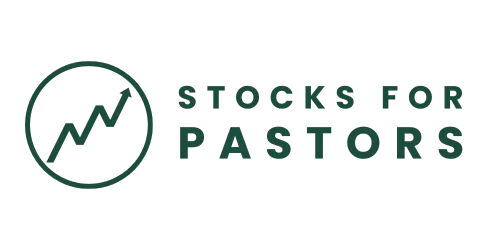Schedule a Meeting with Michael Shafer
The Stocks for Pastors Income Plan isn’t for everyone, and that’s on purpose.
We’re building a community of committed, ministry-minded leaders who are ready to grow a second stream of income with clarity and discipline.
If that sounds like you, I’d love to invite you to apply. Just book a time to chat with me and we'll go from there!
Read Our Latest Blogs
Lorem ipsum dolor sit amet, consectetur adipiscing elit.

Why So Many Pastors Struggle Financially (And What No One Talks About)
For many pastors, talking about money feels awkward. You didn’t get into ministry to get rich. You got into ministry because of a calling: to serve, to shepherd, to lead people to Christ. But that doesn’t mean you and your family are supposed to struggle. The truth is, far too many faithful pastors face ongoing financial stress, and no one talks about it.
This blog is for the pastor who’s done everything right in ministry but feels like something is off financially. If that’s you, know this: you are not alone, and there is a way forward.
The Quiet Financial Strain of Ministry Life
Let’s start with the reality most won’t say out loud. Pastors often live with financial tension. You have a modest salary. The housing allowance helps, sure, but it doesn’t go far in today’s economy. Many of you serve small churches with limited budgets and no retirement match. You’re counseling others on life stewardship while silently wondering how you’ll fund your own future.
Here are the most common financial struggles I’ve seen in over two decades of ministry:
- No retirement plan or savings account to speak of
- Inconsistent income due to bi-vocational work or church limitations
- Mounting debt from seminary, credit cards, or basic cost of living
- The heavy emotional burden of feeling financially behind
- Guilt associated with desiring more income or margin
It’s a recipe for long-term stress and burnout. And it is shockingly common.
The Flawed Financial Advice Pastors Receive
Much of the traditional financial advice assumes a different world; one where you work a corporate job with a predictable salary, benefits, and HR-led retirement planning. That’s not the world you live in.
So when pastors try to apply that advice, they often feel like they’re failing. Maybe you’ve heard things like:
- “Max out your 401(k).” But what if your church doesn’t offer one?
- “Live off half your income and invest the rest.” That may not be practical when your salary barely covers the basics.
- “Hire a financial advisor.” Most pastors I know can’t afford to pay one.
Even well-intentioned advice from friends or mentors can feel detached from your day-to-day reality. What you really need is a strategy made specifically for someone like you.
Financial Struggle Isn't a Character Issue
There’s also a dangerous myth in some ministry circles that struggling financially is somehow more spiritual. As if poverty is a virtue and margin is a sign of materialism. That’s just not biblical.
Scripture is full of principles about wise stewardship, planning for the future, and being a provider for one’s household. Proverbs is clear that wisdom brings wealth, that diligence yields abundance, and that planning leads to profit. These truths don’t disappear because your income comes from a church.
Financial freedom is not about greed. It’s about margin: margin to give, to rest, and to lead without fear.
My Turning Point
There was a season in my own life where I dreaded looking at my bank account. We weren’t making reckless financial decisions. We were just trying to live, tithe faithfully, and raise a family on a pastor’s income. I remember thinking, “If I’m doing all the right things spiritually, why do I feel so stuck financially?”
That question led me on a journey. I used to think being frugal was the answer to everything. I thought if I just stopped spending and saved enough, everything would fall into place. So I did. I cut back. I tracked every penny. I even opened a savings account with high hopes.
But months turned into years, and I watched my savings crawl at a snail’s pace. I wasn’t being lazy. I wasn’t being foolish. I was doing what all the "experts" said to do and yet the results barely moved the needle.
That disconnect between effort and reward is what sent me searching. Not for a shortcut, but for a better way. I stumbled across investing, almost by accident. I didn’t have much money or time, but I had a drive to learn.
I made mistakes. But over time, patterns began to emerge. I noticed certain stocks performed better during specific times of the year. That insight became a spark. I built a strategy around it. One that fit into my pastoral life and didn’t require constant market watching.
What started as a side experiment turned into a real plan; a rhythm I could trust. That system is now what I teach other pastors, through the Growth Plan.
What Changed When I Started Investing With a Strategy
Everything changed when I stopped guessing and started following a process. I didn’t need to be a financial expert. I just needed a plan I could stick to. A plan that fit into my ministry schedule. A plan that honored God and helped me create financial stability.
The more I followed that plan, the more confident I became. Small investments began to grow. Our savings started to take shape. I stopped worrying about how I’d pay for car repairs or future medical bills. I began to see how this kind of margin could help other pastors too.
Now, I coach ministry leaders all over the country using the same exact process.
The Three Ingredients That Make It Work
Inside the Growth Plan, we teach three things:
1. Education: You don’t need a finance degree, but you do need to understand what you’re doing and why.
2. Consistency: It’s not about how much you invest, but how regularly you do it.
3. Strategy: A proven system keeps your emotions out and your goals in focus.
With just a few hours a month, you can start to make real progress without the stress, without the guesswork.
If You Feel Stuck, You're Not Alone
Most pastors who reach out to me have one of three objections: “I don’t have enough time,” “I don’t have enough money,” or “I don’t want to take a big risk.”
My answer is always the same: You don’t need a lot of time. You don’t need a lot of money. And this isn’t about risk. It’s about wisdom.
You can start small. Some of our members began with just $100. You can use a paper trading account to practice without putting any money at risk. You can make your first few trades in under an hour a month.
The point is to start. Start learning. Start observing. Start building a habit that leads to real change.
The Path Forward
If you’re tired of feeling behind financially, let’s change that. You don’t need to figure it all out today. You just need to believe that change is possible and take the next step.
That might mean downloading the free Beginner’s Guide to Seasonal Investing. It might mean booking a call with me to talk about your situation. Or maybe it’s time to jump into the Growth Plan and begin with your first small trade.
Whatever your next step is, take it. Don’t wait for the perfect moment. Don’t wait for a raise or a bigger church. Start where you are.
Because this isn’t just about you. It’s about the legacy you leave, the peace you carry, and the example you set.
Let’s build your financial future together.


